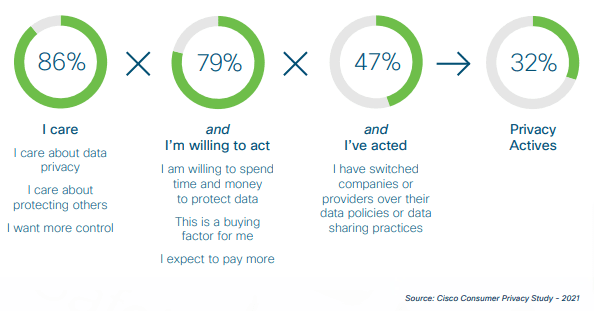The Essentials in Brief:
Ben McDermott stresses that it is wrong to view data privacy simply as a cost centre; it can also help drive revenue...
Yet new challenges appear on the horizon, warns annual study.
- A 2019 report by Forrester suggested GDPR compliance could impact revenues for marketing departments by up to 17% ROI; a finding that has since been consolidated and increased over multiple reports.
- Initially, marketing departments saw compliance purely as a cost, and were happy to push the responsibility to legal departments. Consumer trust and operational efficiencies have reversed that decision.
- A 2021 Data Privacy Benchmark Study by Cisco showed majority belief of the multiple benefits of data privacy initiatives, confirmed by an astonishing 125% ROI.
- However, the 2023 report suggests that while ROI remains strong with a fourth straight year of returns, companies are now attuned to the importance of data privacy but face new challenges.
The changing landscape of digital marketing has found its North Star.
Less than a decade ago, the seismic changes of incoming data privacy regulations were being viewed by many as ruinous.
Apocalyptic visions of an advertising industry in flames were being espoused from certain corners. Thankfully, based on the ingenuity and adaptability of the digital marketing ecosystem, that climate has changed.
GDPR and its worldwide clones have become firmly embedded, not only in the industry’s psyche, but in the understanding of the consumer. They now know that they and their data are being protected, and as such, proffer their trust to those who are interested in protecting them ahead of those who continue to seek purely for their own gain.
Who amongst us has not viewed a 50+ list of adtech vendor optouts without a “Select All” option and simply closed the webpage?
Customers who are willing to give away their data to access a service without bothering to check the terms are fewer every day. High-profile data breaches have made people wary, and supportive of a tougher stance against abuses and lack of care.
In turn, new rights have heightened expectations of transparency and control. When these are lacking, consumers disengage.
Privacy is now an issue squarely in the turf of marketers, which means that that it can be turned in a competitive advantage. If privacy compliance once required a change of procedure; privacy-led growth is the new change of mind. And as always, it helps to stay ahead of the pack…
According to Gartner’s predictions, 65% of the world’s population will have their personal data covered under a data privacy regulation by the end of 2023.
This prediction could yet be surpassed as the much-awaited Digital Personal Data Protection bill (DPDP) was passed by the Indian Parliament on August 10, 2023 to offer the right to privacy as a fundamental right just “a procedural step away from becoming the law” in the most populated country on the planet (17.76% of global population). Even in 2023, privacy law is still developing and is of continued importance to businesses.
Marketers have been appraising the nuances of the marketing relationship before setting the tone on how to use customers’ data for services and products. Even prior to sweeping regulatory changes, when travel website Orbitz used data to steer Mac users to pricier hotels, commentators found it “creepy”. Yet Amazon does not meet the same vitriol when it customises purchase recommendation for its users on similar criteria. Companies that engage users to share more data must also establish a clear framework of expectations for data use, particularly its benefits to the consumer.
Data privacy has been a driver of this communication for over 5 years now. Far from being an unwelcome cost, Cisco’s 2023 Data Privacy Benchmark Study surpassed the suggestion of data privacy ROI in a 2019 Forrester report for the fourth year straight to offer an astonishing metric: For every dollar spent on privacy, the report found that the average business sees a $1.26 return in benefits (down from $2.25 in the 2021 report as the leaders are caught up). There is a sound theoretical basis for these continued returns. Consumer trust is a long term asset for any company when it is seen as a marketing goal, not a risk-avoidance strategy. Indeed, the report showed that most privacy professionals believed that investments had benefits in multiple areas:
- 75% believe privacy investments build trust with customer
- 75% believe they mitigate security losses
- 74% believe they enable operational efficiency
- 74% believe they enable innovation
- 74% believe they make their company more attractive to customers
- 72% believe they reduce sales delays
A survey by Morning Consult in March 2021 found that “respects and protects customers’ data, privacy and security” and “protects my personal data” were in the top three drivers of brand trust among global consumers, at 74% and 73% respectively, driving the peak of the returns. Data privacy compliance is now inextricably linked to the customer marketing journey.
Data privacy and its expectations — security and fairness — have an impact into the marketing relationship.
The Cisco 2021 Consumer Privacy Survey found that 86% of the customers care about data privacy, only using online vendors they trust. Unwelcome or unclear data privacy practices can see 32% of previously loyal customers actively moving away from a business solely due to data privacy concerns.
The 2022 Survey found similar trends, with 76% of respondents saying they would not buy from a company they do not trust with their data, and 81% agreeing that the way an organization treats personal data is indicative of how it views and respects its customers. The survey also explored how the use of AI has further impacted these views, with a majority of consumers concerned about its business use.
Such trends point to a greater understanding of business practices amongst consumers and a new level of scepticism when dealing with data privacy topics. The businesses who will come out ahead of this will be those who look to invest in people-centric solutions that further reinforce the trust of the consumer by providing transparency, control and benefits. This is why we at Teavaro will continue to focus on data privacy as part of our core benefits:
- Boosting your own identity graph allowing you to combine behavioural and customer data in targeting for digital marketing use cases,
- Activating audiences into the open internet without third party cookies for retargeting and look-alike audiences, and,
- Creating a compliant people-centric consent experience.



